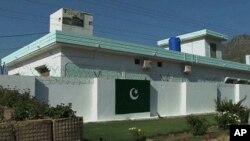In Pakistan’s volatile northwest, the military continues to struggle to counter militant groups - which avoid the battlefield during army offensives but return later to intimidate the local population. As authorities struggle in this back-and-forth fight, they are also trying out new counter-insurgency methods in the northwestern Swat Valley - which the military says was once the country’s main source for Taliban recruits.
At one of several army-run centers in the scenic Swat Valley instructors are trying to de-radicalize former Taliban fighters. The lessons focus on how killing people, and attacking the state, are against Islamic teachings.
Army officers at the heavily-guarded de-radicalization center, called Mishal, say several hundred Taliban prisoners are being trained to become electricians and plumbers as well as computer operators. Officers hope new job skills will help the prisoners avoid a return to militancy.
"[The] purpose is to bring a change in their attitude towards a modern and civilized life, which is within the bounds of the true religious teachings," said one army officer.
Until two years ago, this northwestern region of Pakistan was effectively under the control of Taliban extremists. They imposed their brand of strict Islamic law in the region and executed any opponents.
The valley of Swat is now peaceful. But peace has come at a high financial cost to the government and has required local residents to make great personal sacrifices. Still, many say they are happy to pay the price because life was miserable under the Taliban.
The United States, and some inside Pakistan, are still skeptical about the military’s commitment to counter militant groups - especially since Pakistani intelligence agencies are still thought to support some anti-India extremist groups, as well as the anti-U.S. Afghan group called the Haqqani network.
But military officials point to the Mishal de-radicalization center as evidence of the Pakistani military's commitment against militancy.
Sabaoon - meaning “the dawn” - is another rehab center, taking care of boys aged 12 to 17 who were trained by the Taliban to become suicide bombers.
Teachers and psychiatrists at the center, like Mowadat Rana, say most of the boys here came from impoverished backgrounds, only to be abused by the Taliban.
“These were young boys who had left their studies, who had for long period of times [been] physically abused, and all sorts of other abuses were going on," he said. "They were used as labors and menial workers to look after the Taliban. “
Abdul Nasir, 15, says he was a drug addict when his mother handed him over to the Taliban believing they would help him return to normal life. He says the Taliban would physically torture him as punishment, and one day asked him to become a suicide bomber to escape the abuse. He accepted but was arrested before his mission.
Trainers hope reintegrating these boys with their families will help encourage others to stay away from extremist activities.
“We can’t really probably transform everybody but we can safely say that nearly all of them have changed their view of life and they are hopeful they look at the future with a glitter in their eyes and they talk about the present and they have a renewed sense of understanding of Islam and of Quranic injunctions,” he said.
Military officials plan to set up similar centers in other parts of the country where militancy is a problem. Maleeha Lodhi, Pakistan’s former ambassador to Washington, says it's important to win the confidence of local communities.
“So I think the counter-radicalization program in Swat, for example, is a very important test case of how Pakistan can use non-military methods to also try to establish the conditions to prevent the return of the militancy in the regions that have been cleared,” she said.
But, critics express doubt that the counter-radicalization programs can overcome the effect of thousands of Islamic seminaries across Pakistan, known as madrassas, where children of mostly-impoverished families are given only religious education.
Many believe the madrassas fuel extremism, but Islamic clerics have long resisted government-led reforms.




